Greg Wise
Reviews By Author
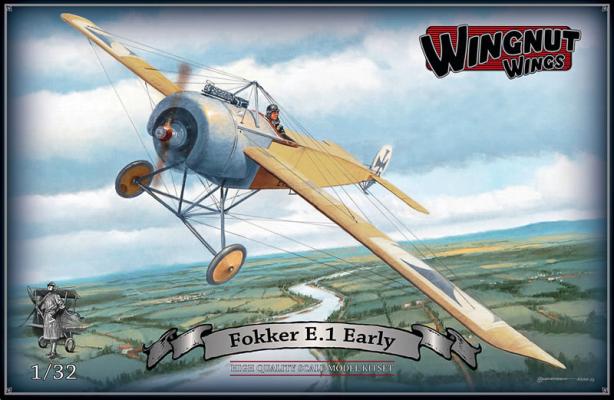
|
Fokker E.1 EarlyPublished:
History BriefThe dreaded Fokker E.1 was the first fighter aircraft to enter service with the German Luftwaffe in World War I. When it arrived at the front in mid-1915, it set in motion a time known as the "Fokker Scourge," in which the E.1 and its lineal Eindecker siblings achieved air superiority over the Western Front. The ProductMy sample arrived in a higher-end box, commonly associated with quality model kits. The box top features a beautiful color print with the famous Wingnut Wings name found in the upper, right-hand corner. Inside the box, I found the parts well protected in the typical poly bags. The parts themselves were flawless and flash-free, featuring delicate detailing. Also included is a photo-etch fret; an unbelievable color instruction… more |
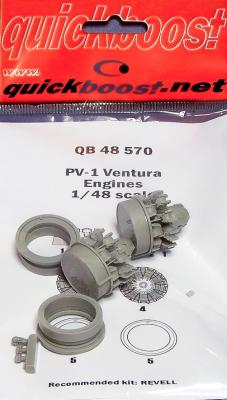
|
PV-1 Ventura EnginesPublished:
The ProductThese highly detailed engines are a great way to enhance your next build. They are a drop in replacement for the kit parts. My samples were beautifully cast, and flawless. The engine’s pushrod tubes are not included in the casting, but locating holes for the pushrod tubes are present for those modelers wishing to add them. I highly recommend these babies to anyone wanting to upgrade the Revell PV-1 Ventura. Thanks to Aires and IPMS/USA for allowing me to present these samples. |
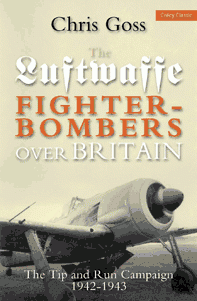
|
Luftwaffe Fighter-bombers Over Britain The Tip and Run Campaign 1942-1943Published:
The Following Text is a Historical Perspective from the Publisher.
|
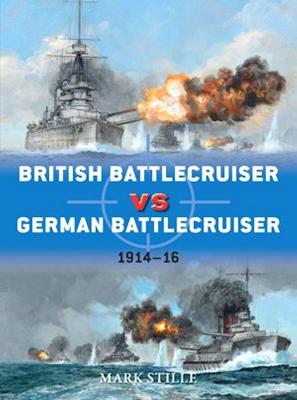
|
British Battlecruiser vs. German Battlecruiser 1914-16Published:
Beautifully illustrated with specially commissioned artwork, this book offers a creditable account detailing the key rival battles between the Battlecruisers of the Royal Navy and the Kaiserliche Marine at the height of World War I. This book covers these opposing Battlecruisers and where they first met in January 1915 at Dogger Bank in the North Sea. The author explains why the battle was a tactical victory for British although neither side lost any of its Battlecruisers. He details the main differences in the designs in the British and German ships and how these two sides responded quite differently to this first engagement. In the book you’ll find out how these differences came into play during the battle of Jutland in May 1916, where of the nine of the British Battlecruisers… more |
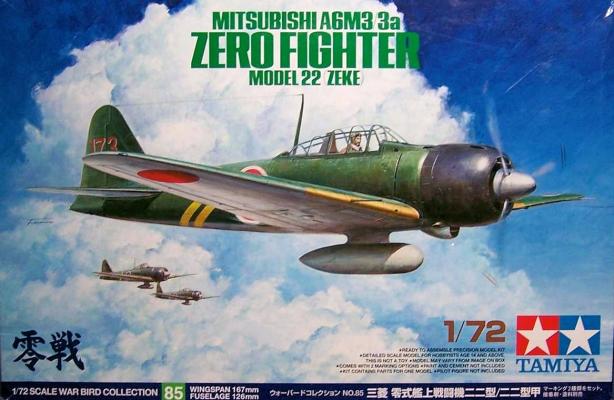
|
Mitsubishi A6M3/3a ZERO FIGHTER Model 22 (ZEKE)Published:
History BriefFollowing the Zero Model 21 (A6M2), the Model 32 (A6M3) Zero was introduced and entered service in the summer of 1942. It was powered by a Sakae 21 engine which featured superior high-altitude performance and an increased top speed. However, the Model 32’s reduced fuel capacity, heavier airframe design, and shorter clipped wings reduced the flight range. In order to fix this problem the Model 22 (A6M3) aircraft was introduced in early 1943. It came with an improved 12m wingspan to correct performance shortcomings and increase maneuverability, additional inner-wing fuel tanks to regain a longer flight range and reintroduced folding wing tips. Deployed mainly to the Solomon Islands from early 1943, The Mitsubishi A6M3/3a Zero fighter was considered by many to be… more |
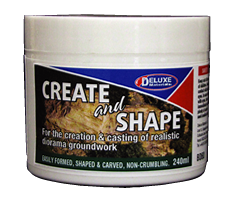
|
Create and ShapePublished:
The ProductAccording to the manufacturer this stuff is a lightweight, non-shrinking scenic material for creating and casting realistic diorama groundwork. It dries without cracking, bonds to wood, plaster, plastic, foam and can be cut, sawn and filed to shape when dry without crumbling. There is a Youtube Demo - https://www.youtube.com/watch?v=1Cc-1xuL2mI&feature=youtu.be The TestAfter carefully viewing the on line you-tube video I began by preparing an 8X10 oval basswood base. I then tried to roll the product into log shapes and let dry overnight. I believe my sample jar was a little dehydrated, as you can see in the photos my success rate was about 70%. I’m… more |
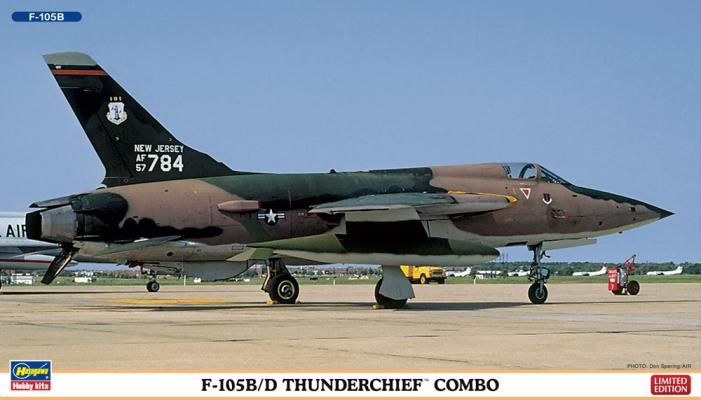
|
F-105B and F-105D (Double Kit)Published:
History BriefWhen the F-105 Thunderchief entered service in 1958, it was the heaviest single-engine combat aircraft and was commonly known as the "Thud" by its crews. In March 1956 the USAF placed an order for 65 F-105Bs and 71 were built. Although it set speed records the 105B was besieged with problems, typically the F-105B required 150 hours of maintenance for each flying hour. Most of these problems were addressed under Project Optimize and by 1964 it was relegated to ANG squadrons. The F-105C (the missing link) was a proposed dual-control trainer; canceled in 1957, none were built. The U.S.A.F. was gradually changing the anticipated F-105 mission from nuclear interdiction to conventional bombing. The F-105D was the primary aircraft type designated to deliver… more |
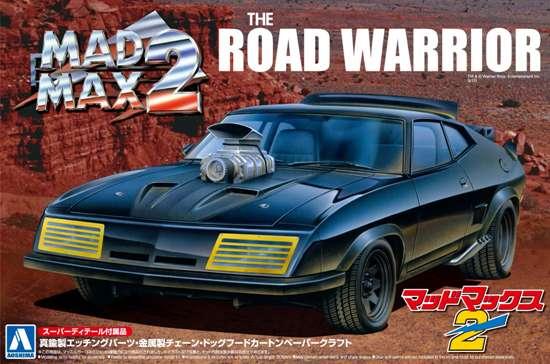
|
MAD MAX 2 The Road Warrior InterceptorPublished:
Car History BriefMad Max's black Pursuit Special was a 1973 Ford XB Falcon GT351, limited edition hardtop (sold in Australia from December 1973 to August 1976). The car was modified by Murray Smith, Peter Arcadipane and Ray Beckerley. After filming of the first movie was completed, the car went up for sale, but had no buyers and eventually it was handed over to Murray Smith (film mechanic). When production of Mad Max 2: The Road Warrior began, the car was purchased back by George Miller for use in the sequel. Once filming was over, the car was left at a wrecking yard in Adelaide since it again found no buyers, then was bought and restored by Bob Forsenko. Eventually it was sold again and put on display in the Cars of the Stars Motor Museum in Cumbria, England. That… more |
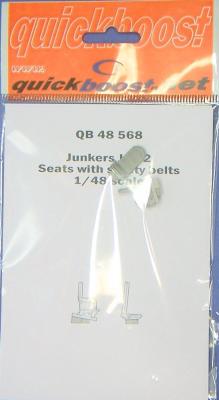
|
Ju-52 Seats with Safety BeltsPublished:
The ProductMy sample arrived packaged in the all-too-familiar orange-topped poly sleeve with the typical card insert. After close inspection of the parts, I found them to be perfect. As you can see, the kit parts offer excellent detail; even so, the Quickboost seats are by far superior in detail, and they’re a drop-in replacement. They are easily detached from the pour block and clean up with a few swipes from a sanding stick. The Bottom LineI recommend these babies to anyone wanting to enhance his Ju-52 build. Thanks to, Aires/Quickboost and IPMS for the opportunity to review these nice little castings. |
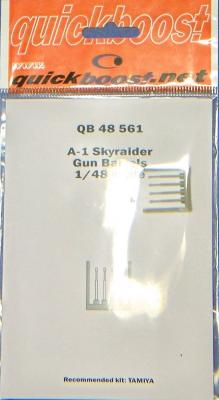
|
A-1 Skyraider Gun BarrelsPublished:
The ProductMy sample arrived packaged in the all-too-familiar orange-topped poly sleeve with the typical card insert. After close inspection of the parts, I found them to be perfect. These little beauties are just what the Doctor ordered. They’re a drop-in replacement for the kit parts. They’re easily detached from the pour block and ready to install. How easy is that? The Bottom LineI recommend these babies to anyone wanting to enhance his Skyraider build. Thanks to, Aires/Quickboost and IPMS for the opportunity to review these nice little castings. |
